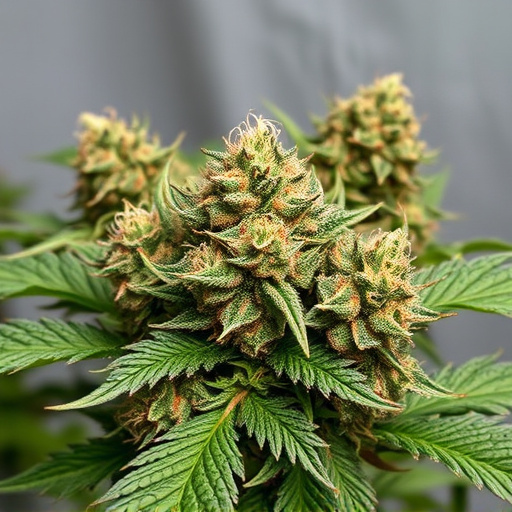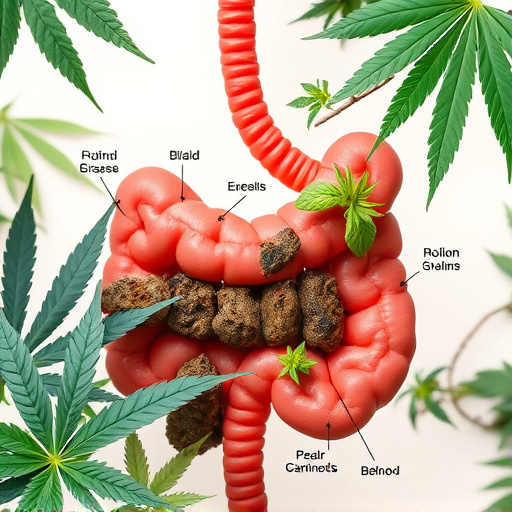For individuals with Crohn's Disease, grinders are essential tools for controlling cannabis intake, as they allow precise grind sizes that maximize cannabinoid and terpene delivery. Different grind sizes cater to various consumption methods. Choosing the right cannabis strains—specifically high-CBD, low-THC varieties known for anti-inflammatory properties—is crucial to balance the benefits of a grinder with potential triggers like strong aromas. Sativa-dominant strains provide energy and reduce anxiety, while Indica and hybrid strains rich in CBD offer anti-inflammatory and analgesic effects. Consulting healthcare professionals or cannabis specialists helps patients select appropriate strains and manage symptoms effectively.
Should you use a grinder for weed? This guide explores the benefits and considerations of grinding cannabis, particularly for those managing Crohn’s Disease. Grinders can enhance the flavor and effects of your favorite strains by optimizing vaporization and extraction. However, individuals with Crohn’s should consider potential triggers, as certain cannabis compounds can affect inflammation. We’ll discuss suitable crohn’s disease cannabis strains known for their calming and anti-inflammatory properties, guiding you in making an informed decision about grinder use.
- Understanding Grinders and Their Uses for Cannabis
- Considerations for Using Grinders with Crohn's Disease
- Exploring Cannabis Strains Suitable for Grinder Use
Understanding Grinders and Their Uses for Cannabis

Grinders, also known as herb mills or cannabis grinders, are tools designed to grind and shred cannabis flowers into smaller pieces. They come in various forms, from manual hand-crank models to electric versions, each offering different levels of convenience and performance. Understanding when and how to use a grinder is essential for optimizing the experience with cannabis strains, especially for users with conditions like Crohn’s disease.
For people who consume cannabis medicinally or have specific dietary needs, grinding herbs allows for precise control over the desired consistency of the final product. This is crucial in ensuring effective delivery of cannabinoids and terpenes, which can impact the overall therapeutic effect, especially for those with digestive issues like Crohn’s. Different grind sizes cater to diverse consumption methods—from vaporizing, where fine grinds are ideal, to edibles or tinctures that may require a coarser texture.
Considerations for Using Grinders with Crohn's Disease

For individuals living with Crohn’s Disease, considering the use of a grinder for weed can be a delicate decision. While grinders offer numerous benefits like consistency and control over the ground cannabis, they may introduce new considerations for those managing a chronic illness. One key factor is the impact on scent and potential triggers. Crohn’s Disease patients often have heightened sensory awareness, and the strong aromas associated with grinding cannabis could exacerbate symptoms for some.
Additionally, it’s crucial to choose the right cannabis strains. Certain high-CBD, low-THC strains are generally recommended for Crohn’s Disease due to their anti-inflammatory properties. Using a grinder, however, should be paired with knowledge about these specific strains to ensure effectiveness and avoid potential discomfort. Consulting with a healthcare professional or cannabis specialist can help navigate these considerations and find the best approach for managing symptoms while using a grinder.
Exploring Cannabis Strains Suitable for Grinder Use

When considering using a grinder for weed, it’s essential to explore cannabis strains that lend themselves well to this method of preparation. Certain strains, with their unique profiles and effects, can be particularly beneficial for specific conditions, such as Crohn’s disease. Sativa-dominant varieties are often recommended for managing symptoms related to inflammation and pain associated with Crohn’s, as they tend to promote energy levels and reduce anxiety. These strains typically have higher THC content, which can provide potent relief without causing excessive sedation.
Indica and hybrid strains with high CBD content are also gaining popularity for their potential anti-inflammatory and analgesic properties. Grinding these strains allows for precise dosing, ensuring you can extract the most beneficial compounds from each bud. This is especially important for medical users, including those with Crohn’s disease, as it enables them to tailor their dosage according to their needs and tolerance levels.
When considering whether to use a grinder for weed, especially if you have Crohn’s Disease, it’s crucial to balance convenience with potential sensitivities. While grinders can enhance the experience by providing a consistent grind for optimal extraction, they may exacerbate symptoms for those with digestive issues. Choosing the right cannabis strains suited for grinder use, like those high in CBD and low in THC, can make the experience more enjoyable and manageable. Always listen to your body and consult healthcare professionals for personalized advice regarding Crohn’s Disease and cannabis consumption.














